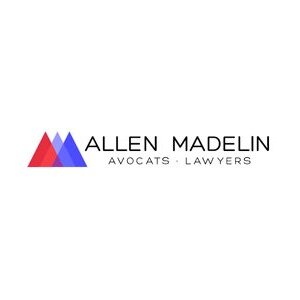Best Water Law Lawyers in Montreal
Share your needs with us, get contacted by law firms.
Free. Takes 2 min.
List of the best lawyers in Montreal, Canada
About Water Law in Montreal, Canada
Water Law in Montreal, Canada, governs the use, management, and protection of water resources within the metropolitan region. This complex area of law covers surface water, groundwater, and navigable waters, drawing from both federal and provincial statutes, as well as municipal bylaws. Water Law addresses how water is allocated, who can use it, water quality standards, pollution control, and the rights and responsibilities of landowners, industries, and government agencies. Given Montreal’s location on the Island of Montreal - bordered by the St. Lawrence and Rivière des Prairies - the regulation and stewardship of water resources are crucial for public health, economic activity, and environmental sustainability.
Why You May Need a Lawyer
You may need a Water Law lawyer in Montreal if you encounter legal issues involving your access to, use of, or rights concerning water. Common situations include:
- Disputes over water access or rights with neighbors or governmental entities
- Issues with water pollution or contamination affecting your property or business
- Concerns around well drilling, municipal water connections, or septic system regulations
- Compliance matters involving industrial or commercial water usage
- Development or land use projects near bodies of water that require environmental assessments or permits
- Flooding or drainage disputes
- Enforcement actions or fines by environmental agencies
- Navigability and use of public waterways
- Negotiations or litigation involving governmental restrictions or expropriations related to water
A qualified lawyer can provide guidance, represent your interests, interpret complex statutes, and help you navigate municipal, provincial, and federal regulatory frameworks.
Local Laws Overview
Water Law in Montreal is shaped by a patchwork of federal, provincial, and municipal legal frameworks.
- Federal: The federal government regulates navigable waters, fisheries, and pollution under statutes such as the Fisheries Act and Canadian Navigable Waters Act.
- Provincial (Quebec): The province manages most aspects of water rights, quality, allocation, and land use through the Environment Quality Act (EQA), Watercourses Act, and Sustainable Development Act. The Quebec government issues permits for water withdrawals, discharges, and other activities affecting water bodies.
- Municipal (Montreal): The City of Montreal has bylaws concerning water supply, stormwater management, wastewater treatment, and environmental protection within city limits. Municipal authorities oversee public works, issue local permits, and enforce rules about private connections, usage, and discharge.
Key legal considerations include restrictions on pollution, maintaining minimum flows, public access to watercourses, and environmental impact assessment requirements for developments near water. Both civil and environmental liability can arise from non-compliance.
Frequently Asked Questions
What are riparian rights, and do I have them in Montreal?
Riparian rights refer to the rights of landowners whose property borders a natural watercourse. In Montreal, these rights are recognized under civil law and allow property owners to make reasonable use of adjacent water, subject to municipal and provincial regulations. However, these rights are not absolute, and limitations apply to prevent harm to neighbors or the environment.
Can I drill a private well in Montreal?
Drilling a private well within Montreal requires complying with both provincial and municipal regulations. Permits are generally needed, and there are restrictions based on zoning and proximity to municipal infrastructure. Always consult with local authorities before commencing drilling.
Who is responsible for stormwater drainage on my property?
Property owners are responsible for ensuring their stormwater drainage does not adversely affect neighboring properties or municipal systems. The city regulates connections to storm sewers and may require approval for modifications. Unmanaged runoff that causes damage can result in liability claims.
What should I do if water from a neighboring property is flooding my land?
Contact your neighbor first to try to resolve the issue amicably. If the problem persists, you can consult with a lawyer to explore legal remedies, which may include seeking an injunction or damages. Document the flooding and keep records of communications.
What permits are required for construction near water?
Any work near a watercourse, wetland, or shoreline generally requires permits from both the provincial government and the City of Montreal. This includes building, land modification, or activities that could impact water quality or flow. Environmental impact assessments may also be necessary.
How are water pollution complaints handled?
Complaints can be filed with Montreal’s municipal environmental authorities or the Quebec Ministry of the Environment. Authorities will investigate and may require remediation, issue fines, or pursue legal action if violations are found.
Are there restrictions on using water from lakes or rivers?
Yes, the withdrawal or use of large quantities of water from public bodies typically requires permits from the province. Unauthorized use or extraction can lead to penalties and legal action.
What happens if there is a water-related contamination on my property?
If contamination occurs, you may be required by law to report it to the authorities and to undertake or pay for cleanup measures. Liability can extend to current and past owners. Seeking legal advice promptly is important in these cases.
Who owns the beds and shores of lakes and rivers in Montreal?
In most cases, beds and shores of water bodies are public property managed by the province. Private rights are limited, and usage is subject to regulation to protect the environment and ensure public access.
Can I challenge a water regulation or bylaw I believe is unfair?
Yes. If you are adversely affected by a regulation or bylaw, you may seek a review or challenge through administrative processes or the courts, depending on the nature of the dispute. A lawyer can advise on the best course of action.
Additional Resources
Several organizations and bodies offer support, information, or oversight related to Water Law in Montreal:
- Ville de Montréal - Environmental Inspection and Water Service: For local regulations, permits, and complaints
- Ministère de l’Environnement, de la Lutte contre les changements climatiques, de la Faune et des Parcs (MELCCFP): For provincial water permits, quality issues, and environmental enforcement
- Fédération des associations pour la protection de l’environnement du Québec (FAPÉQ): Advocacy and educational resources on environmental protection
- Barreau du Québec: Access to lawyer referral services and legal information
- Environment and Climate Change Canada: Federal resources on water quality, pollution, and navigable waters
Each of these organizations can provide information or assistance according to your situation.
Next Steps
If you need legal assistance in Water Law matters in Montreal, take the following steps:
- Document your issue thoroughly, including dates, communications, photographs, permits, and any related correspondence
- Identify the scope of the legal question - such as property rights, permits, or environmental compliance
- Reach out to the appropriate governmental agency for initial guidance, especially if immediate remedies are available
- Contact a lawyer with expertise in Water Law or environmental law in Quebec
- Prepare all documentation for a consultation to facilitate accurate advice and strategy
- Stay proactive about responding to notices, enforcement actions, or other legal developments by adhering to timelines
With the right professional support, you can protect your property, comply with regulations, and assert your rights relating to water resources in Montreal.
Lawzana helps you find the best lawyers and law firms in Montreal through a curated and pre-screened list of qualified legal professionals. Our platform offers rankings and detailed profiles of attorneys and law firms, allowing you to compare based on practice areas, including Water Law, experience, and client feedback.
Each profile includes a description of the firm's areas of practice, client reviews, team members and partners, year of establishment, spoken languages, office locations, contact information, social media presence, and any published articles or resources. Most firms on our platform speak English and are experienced in both local and international legal matters.
Get a quote from top-rated law firms in Montreal, Canada — quickly, securely, and without unnecessary hassle.
Disclaimer:
The information provided on this page is for general informational purposes only and does not constitute legal advice. While we strive to ensure the accuracy and relevance of the content, legal information may change over time, and interpretations of the law can vary. You should always consult with a qualified legal professional for advice specific to your situation.
We disclaim all liability for actions taken or not taken based on the content of this page. If you believe any information is incorrect or outdated, please contact us, and we will review and update it where appropriate.











